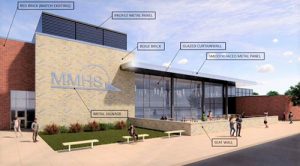
SALISBURY – A discussion on the county’s role in future broadband infrastructure projects highlighted a recent meeting with state and nonprofit officials.
Last week, the Wicomico County Council met with Maryland Office of Statewide Broadband Director Kenrick Gordon and Maryland Broadband Cooperative President and CEO Drew Van Dopp to discuss broadband projects and potential funding opportunities for Wicomico County.
“One of the big problems is Wicomico County does not have large, unserved areas,” Gordon told council members. “They have a lot of small areas that are really hard to build a network to.”
Gordon noted that his office had developed two funding programs in recent years – a small expansion program, geared toward unserved neighborhoods, and a grant program for major broadband infrastructure projects in larger, unserved areas. He noted the smaller grant program would be applicable to those smaller projects in Wicomico.
“For the small projects, the counties have to be proactive,” Gordon said. “They have to make a partnership with an internet service provider and come to my office to request the grant. We don’t give grants out unless somebody asks for them.”
Councilman John Cannon questioned if there was some disconnect between the county and internet service providers. He noted recent middle-mile broadband infrastructure projects in Hebron and Tyaskin, for example, had occurred without the council’s knowledge.
“I thought it was a little odd that the council wasn’t aware of the broadband trunk lines going into different areas …,” he said. “Who determines the need? How is that done? I’m saying this because I want to make sure Wicomico County isn’t missing out on grants.”
Van Dopp explained the Maryland Broadband Cooperative had identified those broadband projects as part of a memorandum of understanding with the Maryland Office of Statewide Broadband.
“It was through that process the OSB was able to provide funding for those projects,” he said.
Officials noted, however, that the county would need to partner with an internet service provider if it wanted to take advantage of state grant funding and pursue smaller broadband projects.
“If there’s a particular neighborhood you’d like to see broadband go into, you can encourage, by way of being the fiscal agent, the internet service provider to go there,” Gordon said.
Councilman Joe Holloway questioned if all internet service providers had similar rates, and if those rates were explained to consumers before they sign on. Gordon explained those rates were disclosed as part of the grant application.
“The rates, in general, are anywhere from $60 to over $100 a month depending on the level of service you get,” he replied. “That’s become kind of the norm.”
When asked if the county could use money from the American Rescue Plan Act to provide matching grant funds, Gordon said it could. However, he encouraged the county to be proactive in seeking state grants.
“The $100 million that’s going to be coming out later in the fall for the large projects, and the $13 million coming out for the small projects, once those funds are gone they’re gone, and I don’t think there’s going to be another $100 million coming our way immediately following,” he said. “So I think you need to be proactive. You’re in competition with 18 other counties, and all of them are getting ready for the next round.”

